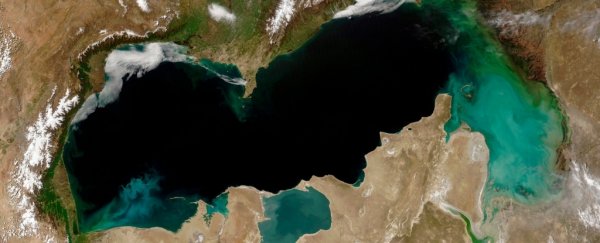Most people know the world's oceans are on the rise, but further inland, the scales of climate change are tipping in the exact opposite direction.
As melting glaciers feed fresh water to the oceans, heat and drought are draining our lakes and inland seas of precious liquid.
The largest inland body of water on Earth, the Caspian Sea, is on a particularly precipitous decline, according to a new study published in Communications Earth & Environment.
Scientists are now warning this salty body of water will fall between 9 and 18 metres (30 and 59 feet) by the end of the century, if emissions continue to rise. A decline of that magnitude would evaporate nearly the entire northern Caspian shelf and some of the Turkmen shelf to the southeast. The eastern margin would be "completely desiccated", say researchers.
 Impact of Caspian Sea Level projections of −9 m and −18 m at the end of the twenty-first century. Red regions fall dry. (Prange et al., Communications, 2020)
Impact of Caspian Sea Level projections of −9 m and −18 m at the end of the twenty-first century. Red regions fall dry. (Prange et al., Communications, 2020)
In the worst-case scenario of an 18-metre drop in sea level, models show 34 percent of this sea's surface area will shrink, and yet this enormous crisis is still thoroughly under-appreciated by the public. Even the scientific community is largely unaware of what's going on.
The International Panel on Climate Change has not addressed lake evaporation from climate change in any of its reports, nor has the United Nations addressed the issue in its sustainable development goals.
"The impacts of the overlooked facet of future sea level change – falling levels of lakes and seas in continental interiors on a global scale – could be similarly devastating as global sea level rise, and threaten the livelihood of millions of people worldwide," the authors of the new paper write.
Due to its size, about 371,000 square kilometres (143,000 square miles), and its salinity levels of around 1.2 percent, the Caspian was deemed a sea instead of a lake.
Without immediate and coordinated action, the Caspian Sea will serve as a poster child for receding lakes in a rapidly warming world. A global task force is therefore urgently needed, the authors say.
If nothing is done, the consequences to the environment will be immense. The projected decline in sea level will severely impact this unique ecosystem, and the loss of shallow water in the south will deprive endemic fish, birds and seals of invaluable habitat, spawning grounds and food sources.
"The expected escalating effects of Caspian sea level decline are likely to lead to a wholesale reorganization of ecosystems, and threaten unique Caspian biota that have been evolving in the basin over millions of years," the new paper concludes.
Even those areas of the Caspian Sea already protected will be "transformed beyond recognition" as deposits of nutrients bypass these rising shelves to head straight to the central part of the basin.
Dead zones will likely emerge as temperatures grow hotter and rivers carry less oxygen to the sea, impacting both the shallowest and deepest waters of the inland sea, similar to what's already happening in some parts of the world's oceans.
The geopolitical consequences are also terribly worrisome. Local economies dependent on fishing and maritime trade will be affected irrevocably, as will coastal ports, which will 'suddenly' find themselves much further from the water. The loss will also likely exacerbate water scarcity issues in the arid region, no doubt causing international disputes.
"As the livelihoods and food security of millions of people depend on the Caspian Sea, a loss of these ecosystem services will have drastic socioeconomic consequences and may trigger local and regional conflicts – in an ethnically diverse region that is already rife with tensions," experts predict.
And this is hardly just a problem for the Caspian Sea. A few recent studies have shown falling water levels in enclosed seas and lake systems, largely due to continental drying from climate change.
Because lakes do not have an outflow, they are particularly vulnerable to rising temperatures. Their water level is almost solely determined by precipitation, river inflow, and evaporation. The same is true of the Caspian Sea, which relies on the Volga River for its inflow.
Precise models for lake retreat around the world are desperately needed to save these precious ecosystems and the economies and societies they support.
Unfortunately, it's too late to save the Caspian through emission cuts alone. Already the inland body of water is declining at a rate of 6 to 7 centimetres (2.4 to 2.8 inches) each year.
Intense regional adaptation and mitigation efforts are therefore desperately needed. Public awareness would be a good place to start. For decades now, the decline of inland lakes has been misunderstood and overlooked even by the experts.
"For example, the IPCC's First Assessment Report (1990/92) suggested an increase in Caspian sea level from about 2010 onwards," the authors write.
"None of the IPCC Synthesis Reports considers this issue further."
A sheer lack of research is part of the problem. The risks and vulnerability of the Caspian Sea due to water loss have barely been studied at all.
Based on the case of the Caspian Sea, the authors are calling for a global campaign to raise awareness and improve research for the world's shrinking lakes and inland seas. They've been neglected for too long.
"Many people are not even aware that an inland lake is dramatically shrinking due to climate change, as our models indicate," says Matthias Prange who creates climate models at the University of Bremen in Germany.
"This has to change. We need more studies and a better understanding of the consequences of global warming in this region."
The study was published in the Communications Earth & Environment.
